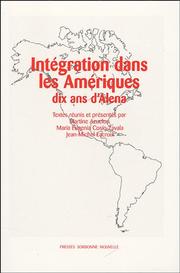| Listing 1 - 3 of 3 |
Sort by
|
Book
ISBN: 3319955373 3319955365 Year: 2019 Publisher: Cham : Springer International Publishing : Imprint: Palgrave Macmillan,
Abstract | Keywords | Export | Availability | Bookmark
 Loading...
Loading...Choose an application
- Reference Manager
- EndNote
- RefWorks (Direct export to RefWorks)
“One of the definite merits of this book is to cleverly mix a theoretical breakthrough with a meticulous historical and empirical account of the transformations of some key Latin American countries. First, it is at the frontier of a research agenda initiated back to the end of the 1970s, second it clearly distinguishes between an ideal-type approach and the complexity of any specific national configuration and its transformation in history. Furthermore, the author provides decisive arguments against a pure economic determinism too frequently supposed to govern institutions building and reforms. Last but not least, the book culminates by an impressive analysis of the crises that quite any Latin America society experiences at the end the 2010s.” -Robert Boyer, Institut des Amériques, Paris, France. This book defends the idea that there are significant structural and institutional differences between the countries in Latin America. Building off the results of a four-year research project, Bizberg argues against the idea that in Latin America there is one single type of capitalism—a hierarchical one—that is entangled in a vicious cycle. Rather, there are clusters of countries that have had similar historical trajectories, analogous structures, or comparable reactions to changes to the world economy, but have not all followed the same mode of development. Just as analysts have found a variety of capitalisms in developed countries, it is possible to identify the emergence of different types of capitalism in Latin America since the 1980s debt crisis. These varieties of capitalism are defined according to categories—including the articulation to the world economy, the role of the State, the structure of the political system and the action of civil society—which give rise to distinct wage relations, comprising the industrial relations system and the welfare regime.
Capitalism --- Economics. --- Latin America—Economic conditions. --- Political Economy/Economic Systems. --- Latin American and Caribbean Economics. --- Economic theory --- Political economy --- Social sciences --- Economic man --- Economic policy. --- Economic nationalism --- Economic planning --- National planning --- State planning --- Economics --- Planning --- National security --- Social policy

ISBN: 9681208455 607628806X Year: 1998 Publisher: El Colegio de México
Abstract | Keywords | Export | Availability | Bookmark
 Loading...
Loading...Choose an application
- Reference Manager
- EndNote
- RefWorks (Direct export to RefWorks)
Cualquiera pudo pensar que el fin de la guerra fría marcaría más certezas que debilidades. Sin embargo, esta obra nos permite reflexionar sobre sus consecuencias: la desaparición de bloques y con ello el cierto equilibrio que éstos imponían al sistema internacional o interestatal. Bajo este marco, cada país está atenido a sus propias capacidades y fuerzas y la acción internacional no se definirá más por un frío cálculo racional, sea económico o de otro tipo, sino que estará definida (por lo menos parcialmente) en términos ideológicos y éticos. ¿En qué contexto se define, entonces, la política exterior de nuestro país?
International relations. Foreign policy --- Mexico --- Foreign relations --- Anáhuac --- Estados Unidos Mexicanos --- Maxico --- Méjico --- Mekishiko --- Meḳsiḳe --- Meksiko --- Meksyk --- Messico --- Mexique (Country) --- República Mexicana --- Stany Zjednoczone Meksyku --- United Mexican States --- United States of Mexico --- מקסיקו --- メキシコ --- History of the Americas


ISBN: 2878542819 287854904X Year: 2017 Publisher: Paris : Presses Sorbonne Nouvelle,
Abstract | Keywords | Export | Availability | Bookmark
 Loading...
Loading...Choose an application
- Reference Manager
- EndNote
- RefWorks (Direct export to RefWorks)
Dix ans après la signature du traité instituant l'Accord de libre-échange de l'Amérique du Nord (ALENA) et à l'heure où le projet de Zone de libre-échange des Amériques (ZLEA) semblait devoir se concrétiser pour 2005, il était temps de dresser, pour la première fois en France, un bilan des effets, tant sociaux et culturels qu'économiques, de cet accord et des débats qu'il a suscités au Canada, aux États-Unis et au Mexique. L'ALENA est ici traité comme un exemple particulièrement démonstratif des nouveaux processus d'intégration régionale qui ont connu une intensification remarquable pendant la dernière décennie, tant en Amérique que dans le reste du monde. Les questions importantes soulevées au moment de sa signature et de sa ratification restent d'actualité : questions politiques au sens large, qui portent sur la souveraineté des États contractants, la protection des droits des travailleurs et de l'environnement, mais aussi conséquences économiques, territoriales et sociales d'une nouvelle configuration géopolitique, représentant un « bloc » de 400 millions d'habitants. Ces questions sont abordées ici dans une perspective pluridisciplinaire, favorisée par la diversité des points de vue portés sur l'intégration nord-américaine par une vingtaine d'universitaires et de chercheurs mexicains, canadiens, américains et français.
Free trade --- North American Free Trade Agreement --- North America --- Economic integration --- NAFTA --- Tratado Trilateral de Libre Comercio --- TTLC --- Tratado de Libre Comercio en América del Norte --- TLCAN --- Tratado de Libre Comercio de Norteamérica --- Hokubei Jiyū Bōeki Kyōtei --- Acordo Norte-Americano de Livre Comércio --- T.L.C. --- TLC --- Accord de libre-échange nord-américain --- ALENA --- Tratado de Libre Comercio --- Agreement between Canada, the United States of America, and the United Mexican States --- Turtle Island (Continent) --- Tratado de Libre Comercio de América del Norte --- United States-Mexico-Canada Agreement --- Amérique du Nord --- Canada --- effets économiques --- accord de libre échange de l'Amérique du Nord --- effets sociaux --- Mexique --- Accord de libre-échange nord-américain (1992)
| Listing 1 - 3 of 3 |
Sort by
|

 Search
Search Feedback
Feedback About
About Help
Help News
News